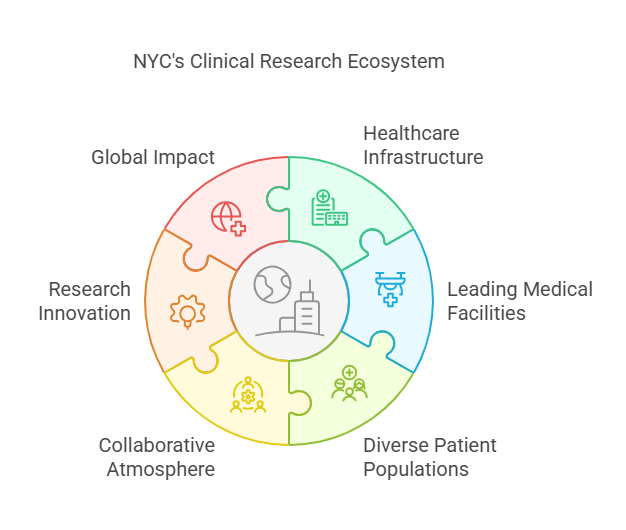Clinical Research Opportunities in New York City
Hey, future lifesavers! Are you ready to dive into the bustling world of clinical research in the city that never sleeps? If you've ever wondered how to blend the adrenaline of NYC with the thrill of medical breakthroughs, you're in the right place. Let's unravel the vibrant tapestry of opportunities in clinical research that New York City has to offer. Buckle up, because this isn't your grandma's guide to clinical trials!
The Rise of Clinical Research in New York City
New York City has emerged as a significant hub for clinical research, largely due to its robust infrastructure in healthcare and innovation. The city's prominence in this field is bolstered by its array of leading-edge medical facilities and a network of top-tier hospitals. These institutions are not just centers of care but also pivotal in advancing medical research.
Clinical research in NYC benefits from the city’s dynamic environment that harmoniously blends scientific inquiry with urban vitality. This unique setting provides researchers with unparalleled access to diverse patient populations, cutting-edge technologies, and a collaborative atmosphere that fosters innovation and speedy dissemination of research findings.
For budding researchers and seasoned experts alike, New York City offers fertile ground for personal and professional growth. Researchers here are at the forefront of designing and conducting studies that may lead to significant medical breakthroughs, directly impacting patient care and treatment methodologies globally.
Benefits of Participating in Clinical Research
Participation in clinical research is incredibly beneficial not just for the progression of science, but also for the participants themselves. Here’s a closer look at the benefits:
Complimentary Medical Care: Participants in clinical research often receive high-quality health services at no cost. This is especially significant given the expensive nature of healthcare. Participants benefit from comprehensive monitoring and assessments that might not be otherwise available or affordable.
Active Involvement: Being part of a clinical trial allows individuals to play an active role in the healthcare process. Participants contribute directly to the development of new treatments and therapies, which can be rewarding both personally and socially. They are at the heart of processes that have the potential to change the landscape of medicine and offer new solutions to pressing health challenges.
Lifestyle Enhancement: Many clinical studies require participants to adopt new health habits or modify existing ones as part of the research protocol. This can lead to long-lasting lifestyle changes that improve overall well-being. For instance, a study might encourage better dietary habits, increased physical activity, or regular health check-ups, which are beneficial beyond the duration of the trial.
Early Access to Treatments: Participants in clinical trials often have the opportunity to access new therapies before they become widely available. This is particularly advantageous for those who may not have had success with standard treatments. These cutting-edge therapies, under careful supervision, can offer new hope and avenues for care.
Diversity in Clinical Trials
The significance of diversity in clinical research cannot be overstated, especially in a multicultural epicenter like New York City. The city's demographic diversity offers a unique advantage for clinical trials, as it includes a wide range of genetic backgrounds, lifestyles, and health conditions. Ensuring diverse participation in clinical studies is crucial because it leads to more comprehensive data and helps researchers develop treatments that are effective across different populations.
Inclusive research addresses varied responses to treatments due to genetic, environmental, and social factors. For example, some medications may have different efficacy rates or side effects in different ethnic groups. By including a diverse participant pool, researchers can identify and address these variations, leading to safer and more effective therapies. Furthermore, diversity in clinical trials promotes equity in healthcare by ensuring that all communities have access to the latest treatments and interventions.
Despite the clear benefits, achieving diversity in clinical trials remains a challenge due to historical mistrust in medical research, language barriers, and socioeconomic factors that can limit participation. Efforts to increase diversity include community engagement initiatives, multilingual resources, and policies that require or incentivize representation from various demographic groups.
Challenges and Barriers
Clinical research, while essential for medical advancement, faces numerous challenges and barriers, particularly in an urban setting like New York City:
Funding Issues: Securing adequate funding is a perennial challenge. Research initiatives often depend on federal grants, philanthropic donations, or corporate backing, which are highly competitive and subject to economic fluctuations.
Patient Recruitment: Recruiting enough participants to yield statistically significant results can be difficult. Challenges include reaching the target demographic, overcoming hesitancy related to participating in trials, and logistical issues like travel and time commitment for participants.
Complex Trial Design: Designing a trial that effectively tests a hypothesis while ensuring patient safety requires meticulous planning and regulatory approval, which can be time-consuming and complex. Adapting trial designs in response to early results or external factors, such as a pandemic, adds to the complexity.
Regulatory Hurdles: Navigating the maze of regulations that govern clinical trials is another significant barrier. Compliance with both local and federal laws is critical but can delay the initiation and progress of research studies.
Addressing these challenges requires innovative approaches, such as using digital tools for patient recruitment and data collection, improving funding mechanisms, and enhancing collaboration between governmental, academic, and private sectors.
Future Outlook
The future of clinical research in New York City looks promising, driven by several favorable factors. Continued advancements in technology, such as artificial intelligence and machine learning, are expected to streamline many aspects of clinical research, from data analysis to patient monitoring and personalized medicine approaches.
The integration of digital health tools, like mobile apps and wearable devices, will likely expand the scope and efficiency of clinical trials. These tools can facilitate real-time data collection and patient engagement, potentially reducing costs and speeding up the research process.
Healthcare policy changes, particularly those that encourage or mandate more inclusive research practices or streamline regulatory processes, can significantly impact the clinical research landscape in New York City. For instance, policies aimed at enhancing public-private partnerships could spur innovation and provide more robust support for research initiatives.
Additionally, as public awareness of the importance of clinical research grows, especially in the wake of global health crises like the COVID-19 pandemic, there may be greater willingness among the general population to participate in clinical trials. This could ease some of the recruitment challenges currently faced by researchers.
Explore Courses for Clinical Research Career
Courses Available:
Conclusion
As we wrap up our deep dive into clinical research opportunities in NYC, remember that CCRPS stands as your beacon through the bustling career pathways of this field. Whether you're starting out or stepping up, CCRPS provides the tools, training, and network you need to excel. Embark on your journey with us today, and transform your passion for science into groundbreaking contributions to healthcare!
Frequently Asked Questions
-
Clinical research roles in NYC require varying levels of education and experience, from bachelor's degrees in related fields to specific certifications like those offered by CCRPS.
-
Salaries vary widely based on role and experience, but NYC offers some of the highest wages in the sector, reflecting the city's cost of living and competitive job market.
-
Personalized medicine, remote monitoring technologies, and patient-centric study designs are shaping the future of clinical trials.














